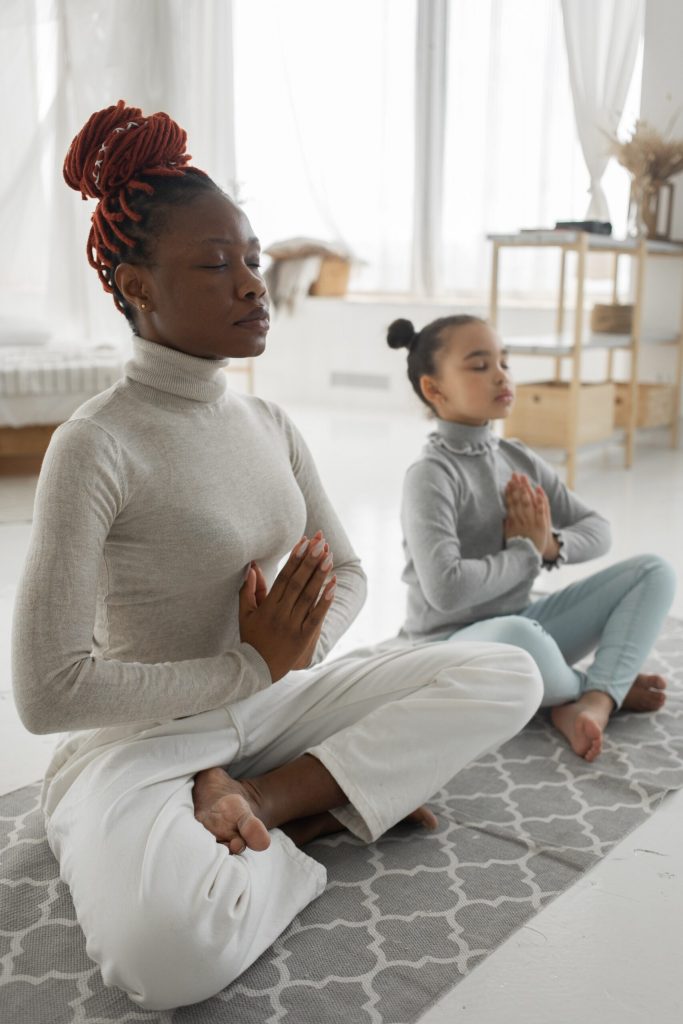By Fatima Malik
What Practicing Mindfulness does for the Family
Mindfulness is defined as a mental state achieved by focusing one’s awareness on the present moment while calmly acknowledging and accepting one’s feelings, thoughts, and bodily sensations. This is a therapeutic technique and can be achieved in several ways. Practicing mindfulness does for the family to achieved happiness and good harmony at home.
When someone says mindfulness, the first thing that comes to mind is “meditation,” Yes, meditation is one way of achieving mindfulness, but there are several other ways.
Just focusing on your breathing for 5 minutes while you drive is an act of “practicing” mindfulness.
It’s that simple, and it’ll improve your life drastically.
How?
Ever heard the saying “happiness lies within”? Well, that is what mindfulness taps into and while practicing on it, it does a lot on family harmony.
Happiness is usually conditional on your environment, situation, the people you’re around and (mostly) the money you have.
But what we think is happiness is just the gratification of having solutions to our problems. That means that when you find a solution to common problems in your life, you feel good and think that is true happiness, but it is not.
Happiness is mostly contentment and not ecstatic joy. It’s not like winning the lottery; it’s waking up content, everything is good, everyone you love is healthy, and you’re ready to start your day.
So, where does mindfulness come in?
Mindfulness helps you experience and observe your daily life calmly and practically where you do not get sucked into negative emotion because your coffee order was wrong.
You’re never late or in an ‘unhealthy hurry’ to get anywhere – because “a wizard arrives precisely when a wizard is meant to” jk – it is because your mental health is way more precious than risking your life to get to a meeting.
How will this help your family life?
When you are mindful of your emotions, you will be aware of your reactions to your children and your partner.
When you practice mindfulness as a family, you’re giving your children invaluable skills to navigate life in the best possible way.
Example of mindfulness and how it’ll improve things for you and your family:
Eating:
It is being present when you eat. We overeat all the time.
The psychological effect of that is that we only taste the first few bites of our food. The rest is consumed absent-mindedly, and even though we have eaten as much as we should, our brain has not been able to experience it the same way.
The act of eating food boosts our ‘good’ hormones – the ones that make us happy. But when we don’t fully experience the food we’re eating, we do not get the hormone release we need, so we eat more.
It doesn’t work because we do not experience that second plate either. It’s a vicious cycle.
The solution?
Before eating, focus on breathing. The act of breathing and focusing on it brings you to the present moment. So when you start eating, you are aware, and your brain is experiencing the act. Focus on tasting the food for as long as possible (unconsciously eating is inevitable).
What is meditation?
Meditating is not the ‘lack’ of action. It is a state of mind. You can meditate while driving (don’t close your eyes while driving, please). As long as you focus on the present moment and not let your mind wander, you’re practicing mindfulness.
If you meditate the traditional way, nothing special is needed. For example, you can close your eyes, focus on your breathing and bring your eyes to the front of your eyelids (if your eyes roll back, you’ll wander), and focus on a spot on the inside of your eyelid.
No matter how long you do this for, you’ve done it. The more you practice, the better you’ll get at it.
When you succeed at doing this for 5 minutes, you can focus on your current self. How are you feeling, what sensations is your body feeling etc.?
How will being mindful help me be a better parent?
When you’re being mindful, you’ll start to understand that you can be the ‘action,’ not the ‘reaction’ to your life. When you enter a room, you will not react to existing circumstances, and you’ll establish your own.
Being present will help you respond better to your children when they interrupt you while working or concentrating on something on your phone.
You’ll be able to take a breath and calmly respond to their request, and since your children are sponges, they will mimic your energy and react calmly, too. Whatever problem they came to you with suddenly won’t be such a problem anymore.
There are many other ways to practice mindfulness, and practicing it as a family will improve all aspects of your life, including stresses at work.
Take a moment to sit down and breathe with your kids. Teach by example how you react to situations outside of your control. How do you handle conflict with your partner (especially if the kids are watching), how do you handle the pressures of money and bills?
Mindfulness shows you a better way of handling life – and this will encourage your children to handle life similarly. Life will always have its ups and downs. How you let them affect you determines your quality of life.
To learn more about Practicing Mindfulness does for the Family Positive Kids has a lot to help.

